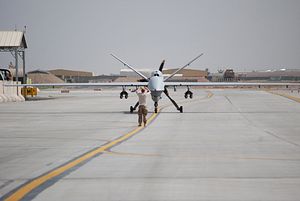Australian air force personnel have begun training on armed drones in the United States days after Washington announced the easing of restrictions surrounding their export and sale, media reports indicated Monday.
According to Reuters, Australia has sent personnel to train on the General Atomics MQ-9 “Reaper” drone, a sign that it is considering a purchase further down the line even though Australian defense officials say a decision has yet to be taken.
“Unmanned aerial systems are an advancing technology with a proven record of providing ‘eyes in the sky’ in the Middle East region,” Australian Parliamentary Secretary to the Minister of Defense Darren Chester said in a statement. “It would be remiss of Australia not to continue to develop our knowledge of this technology to ensure we are able to gain the greatest benefit from unmanned aerial systems and the best protection for our troops on future operations.”
Last week, the Obama administration established a policy for the export of commercial and military drones following a lengthy review, opening up the possibility of Washington equipping allies like Australia under strict conditions.
Currently, only Britain flies U.S. armed drones, with a few other nations flying surveillance drones. But several countries are reportedly now eying armed and unarmed variants, including Italy, Turkey, the United Arab Emirates, and the Philippines as The Diplomat reported last week.
Last year, Australia had already indicated its interest in purchasing the U.S. Navy’s MQ-4C Northrop Grumman-made Triton unmanned aircraft and Boeing’s P-8A Poseidon long-range spy planes. Australia’s air force chief Geoff Brown has also said previously that Australia was keen on acquiring Reaper drones as well.
Drones are not without controversy in Australia. Australia’s alleged involvement in covert U.S. drone strikes through the joint military facility at Pine Gap near Alice Springs raised suspicions among some about a lack of transparency and accountability should Canberra decide to acquire U.S. drones.
“Our government hasn’t even been willing to come clean about its role in the U.S. drone program, so the prospect of it pursuing its own drones program is deeply troubling,” Emily Howie, director of advocacy and research at Australia’s Human Rights Law Center, said earlier this month.
Meanwhile, the increasing popularity of drones among private users in Australia has also sparked growing privacy concerns, and the country has recently been trying to tighten regulations for recreational drone users.
































